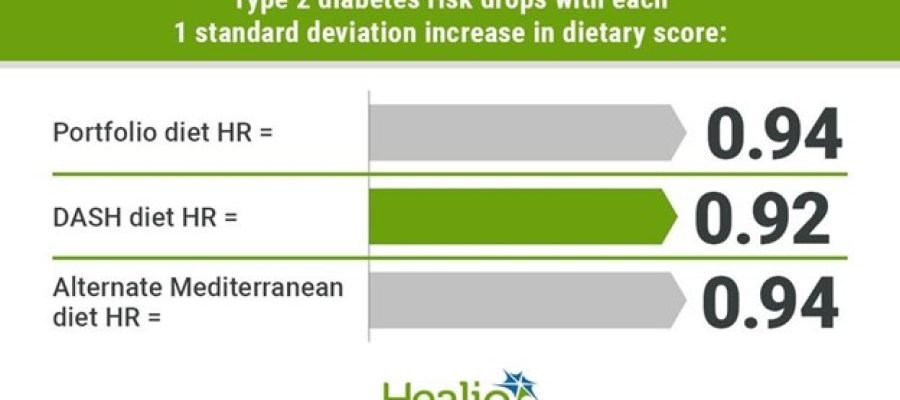Want to learn how you can Maximize Your Energy & Recovery? Click Here
Women who adhered more to a plant-based Portfolio diet lowered their risk for developing type 2 diabetes, according to findings from the Women’s Health Initiative published in Diabetes Care.
“There are two main takeaways from this study,” Andrea Glenn, Ph.D., RD, a postdoctoral research fellow in the Department of Nutrition at the Harvard T.H. Chan School of Public Health and in the Department of Nutritional Sciences at the University of Toronto, told Healio. “The first is that we saw all three dietary patterns (Portfolio, Dietary Approaches to Stop Hypertension [DASH] and Mediterranean) we assessed were similarly associated with a reduced risk of developing type 2 diabetes, highlighting that there are several combinations of plant-predominant diets that may be beneficial for diabetes prevention. The second would be that we saw a linear dose-response with adherence to the Portfolio diet and type 2 diabetes risk, therefore emphasizing that adopting one or more of its components is better than none for diabetes prevention.”
Data were derived from Glenn AJ, et al. Diabetes Care. 2022;doi:10.2337/dc22-1029.
Glenn and colleagues analyzed data from postmenopausal women who enrolled in the WHI clinical trials or observational studies between 1993 and 1998. Women who were free of type 2 diabetes at baseline were included in the analysis. Adherence to the Portfolio diet was assessed through a modified Willett food-frequency questionnaire that incorporated self-reported food and nutrients at enrollment and year 3 for observational study participants. Food items were categorized into six components of the Portfolio diet: plant protein, nuts, viscous fiber, plant sterols, monounsaturated fatty acids, and high-saturated fat/dietary cholesterol sources. Each component was scored from least adherent to most adherent according to each participant’s quintile of intake. Similar dietary scores were derived for adherence to the DASH diet and alternate Mediterranean diet, with higher scores indicating higher dietary pattern adherence. Incident cases of type 2 diabetes were identified through self-reports of physician-diagnosed diabetes treated with oral medication or insulin.
Type 2 diabetes risk reduced with Portfolio diet adherence
The study included 145,299 women, of whom 13,943 developed type 2 diabetes during a mean follow-up of 16 years. In a model that adjusted for covariates, including BMI, women with the highest adherence to the Portfolio diet (adjusted HR = 0.87; 95% CI, 0.82-0.93; P < .001), DASH diet (aHR = 0.78; 95% CI, 0.72-0.83; P < .001) and alternate Mediterranean diet (aHR = 0.88; 95% CI, 0.83-0.94; P < .001) had a lower risk for incident type 2 diabetes than women in the lowest adherence quintile for each respective diet. Each 1 standard deviation increase in dietary score for the Portfolio diet (HR = 0.94; 95% CI, 0.93-0.96), DASH diet (HR = 0.92; 95% CI, 0.9-0.93), and alternate Mediterranean diet (HR = 0.94; 95% CI, 0.93-0.96) was associated with a lower risk for developing type 2 diabetes.
“While we expected that all three dietary patterns would be associated with a lower risk of type 2 diabetes, we were surprised that the associations were so similar when looking at the 1 standard deviation increase in score,” Glenn said. “While there is a lot of overlap in these dietary patterns, they were not perfectly correlated with each other, highlighting that each dietary pattern reflects some unique combination of foods. The great thing about this surprising finding though is that … it provides more choice for patients to help lower their risk of type 2 diabetes, and they can choose a dietary pattern that will be easiest for them to incorporate into their daily lives.”
Individual dietary components still confer benefits
When the individual components of the Portfolio diet were assessed, women who had a higher intake of viscous fiber sources (HR = 0.93; 95% CI, 0.87-0.99) and plant sterols (HR = 0.85; 95% CI, 0.78-0.92) and lower intake of saturated fat and dietary cholesterol sources (HR = 0.83; 95% CI, 0.77-0.88) had a lower risk for incident type 2 diabetes. Glenn said these findings revealed adults can lower their risk for type 2 diabetes even if they only incorporate a few components of the Portfolio diet.
“In clinical practice, patients can choose the parts of the Portfolio diet that will be easier for them to include in their diet first to help achieve this success,” Glenn said. “Our findings are also in agreement with diabetes clinical practice guidelines and corroborate that there are several dietary patterns that may be useful for diabetes prevention. Because adherence to diet is the most important determinant for patient success, health professionals should recommend evidence-based dietary patterns that best align with a patient’s values and preferences, including for postmenopausal women.”
Andrea Glenn, PhD, RD, can be reached at aglenn@hsph.harvard.edu.
Learn how your experiences in your youth can influence your food choices as an adult! Click Here
Please review our business on Google Yelp Facebook
Please visit our Member’s Area to access our subscribed content to learn more.
Did you know you can work out and exercise with a trainer at your home, office, hotel room, or anywhere in the world with online personal training?
Like us on Facebook/Connect with us on LinkedIn/Follow us on X
Pinterest/Instagram/YouTube/TikTok
Make sure to forward this to friends and followers!






